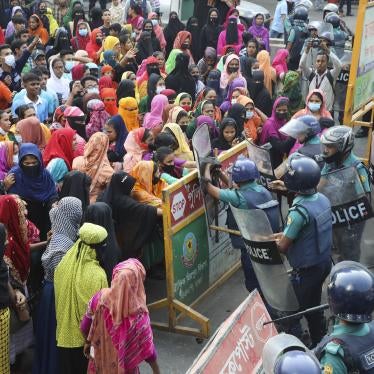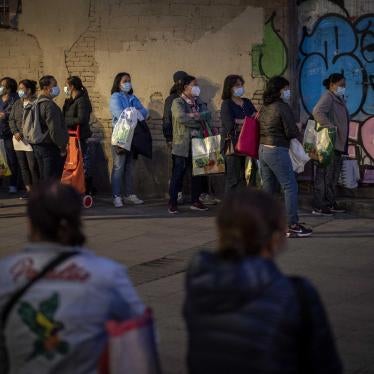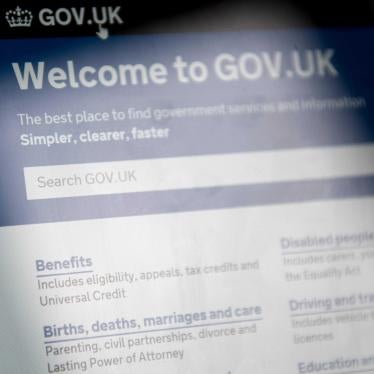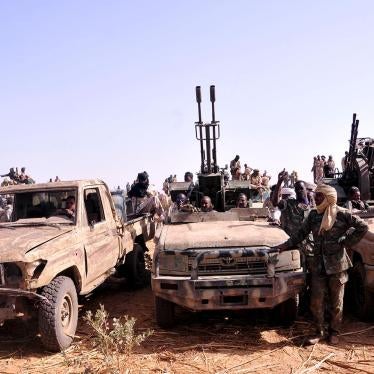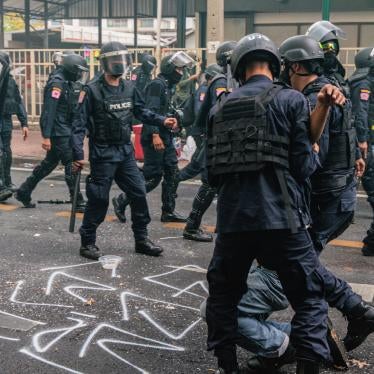Human Rights Watch is writing to express deep concern regarding the conditions of detention for undocumented migrants in Greece. The enclosed urgent memorandum documents conditions found by our researchers at the Attica General Police Directorate detention facility for foreigners on Alexandras Avenue in Athens on November 18, 2000. Human Rights Watch found appalling conditions of detention that violate international and regional standards for the treatment of detainees and may amount to cruel, inhuman, and degrading treatment.
We call on the Security Council to impose an arms embargo on all warring factions until significant progress is made to end violations of human rights and humanitarian law and to bring the perpetrators to justice, not just the one-sided embargo unconnected to the human rights of the Afghan people which is currently contemplated. We also urge the Security Council to take additional measures to protect delivery of humanitarian aid, including lifting the existing ban on international flights by Ariana, the Taliban-controlled carrier, because the ban has interfered with the delivery of medicines to civilians.
The Security Council should restrict arms sales to all warring factions; all have committed severe abuses and none is making a serious effort to bring perpetrators to justice. The ban should be strictly monitored and enforced and should include all forms of military assistance, including arms, other military materiel, and military training. Although Taliban forces are currently on the offensive and have been responsible for some of the worst recent incidents, the parties that constitute the National Islamic United Front for the Salvation of Afghanistan (the "United Front") have also committed grave abuses in the conflict. The cumulative result has been massive internal displacement and large refugee flows into neighboring countries.
According to estimates by international relief agencies, there are presently at least 140,000 internally displaced persons in Afghanistan as a result of armed conflict during 1999 and 2000. In addition, some 30,000 refugees arrived in Pakistan between early September and November 9, when the border was officially closed to all but those who had already registered with UNHCR. An additional 17,000 refugees have since made their way to Pakistan despite the border closure. Other avenues of flight have been closed off or severely limited, with Tajikistan sealing its border in mid-September, following the Taliban's capture of Taluqan city, and Iran turning away thousands of new refugees and detaining others.
This displacement is directly linked to the conduct of the warring parties, and the devastating effect that such conduct has had when combined with the severe drought that has hit the region. During the past two years, Taliban offensives have been accompanied by scorched-earth tactics in the Shomali plains north of Kabul, summary executions of prisoners in the north-central province of Samangan, aerial bombardment of opposition-held areas in the central Hazarajat region, and forced relocation and conscription in newly-occupied areas. The burning of crops and destruction of irrigation systems in 1999 have prevented many rural families from returning to their places of origin. Other families have been unable to continue farming or grazing, after having sold off livestock in order to make payments to avoid conscription. As is well known, the Taliban has also continued to discriminate harshly against women. Taliban officials have continued to beat women on the streets of Kabul for dress code violations and for venturing outside the home without the company of a close male relative. In Kabul, girls are for the most part not permitted to attend school, although primary schools for girls are permitted in other parts of the country. Women's employment remains severely restricted and is generally limited to the health care sector.
During the same period, military setbacks have left United Front forces defending home territories in northeastern and central Afghanistan. There have nevertheless been reports of abuses in districts, such as Bamiyan and Sangcharak in 1999, that were temporarily held by United Front factions. The principal targets in these attacks, which include summary executions, burning of houses, and looting, have been ethnic Pashtuns and others suspected of supporting the Taliban. The various parties comprising the United Front also amassed a deplorable record of attacks on civilians between the fall of the Najibullah regime in 1992 and the Taliban's capture of Kabul in 1996. In fighting with the Taliban and in internecine battles among themselves for control of Kabul, Jamiat-i Islami, Junbish, Hizb-i Wahdat, and other United Front factions repeatedly engaged in aerial bombardment and shelling of residential areas, and in some areas committed rapes and summary executions of civilians.
The abuses just described are facilitated by the involvement of Afghanistan's neighbors and other states in providing weapons, ammunition, fuel, and other logistical support to their clients. In his report last month to the General Assembly on the situation in Afghanistan, U.N. Secretary-General Kofi Annan observed that "the flow of arms and other war-making materiel into Afghanistan continued unabated" during the past year, as indicated by the intensity of this year's fighting, and "even rose to new levels" during the last few months. State and non-state actors across the region and beyond continue to provide new arms and other materiel, as well as training and advisory assistance. Other countries have indirectly provided support to the combatants.
The principal supplier to the Taliban is Pakistan. The parties that comprise the United Front obtain arms from Iran and the Russian Federation. The arms provided have been directly implicated in serious violations of international humanitarian law. The appendix attached to this letter provides background to the conflict, additional information on humanitarian law violations by all parties, and a summary of external military support to the combatants. Ending this arms flow is an essential step toward curtailing the suffering of the Afghan people.
We also urge the Security Council to ensure effective monitoring and enforcement of the arms embargo. The seriousness with which the December 8 draft currently before the Council addresses these issues marks an important advance, which we commend. The proposal offered here, however, will require additional measures to ensure that the ban is enforced equally against all parties and does not inadvertently end up assisting one side. One precondition to success is deployment of a sufficient number of international monitors on the ground. We note that an arms embargo study produced by the U.N. Secretariat, entitled "A Review of the Options on Embargo of Military Supplies to the Warring Factions in Afghanistan," found that unless observers were stationed on the ground in Afghanistan, monitoring, detection, and assembly of evidence would be "virtually impossible." The ban on new weapons flows should also include benchmarks against which compliance can be measured.
Finally, any embargo, including the existing one, needs to minimize humanitarian harm. Although some Security Council members have characterized the proposed sanctions as "smart sanctions" because of provisions specifically designed to ensure continued delivery of aid to civilians, we believe those provisions do not go far enough. In particular, we urge that the Security Council withdraw the existing ban on all international flights by aircraft owned, leased, or operated by the Taliban, a ban it imposed as part of sanctions in October 1999.
Prior to the imposition of the flight ban, the state airline Ariana operated cargo and passenger flights to and from Dubai and Sharjah. According to a report that was issued this month by the Office of the U.N. Coordinator for Afghanistan, the ban has prevented a major health care institution in Kabul, the Indira Gandhi Pediatric Hospital, from restocking essential drugs with its main supplier; together with India's curtailment of donated medicines, this has led to an exhaustion of the hospital's stocks and forced children's families to purchase medicines in the market at prohibitive cost. The ban was also found to have disrupted postal services and contributed to loss of income and employment in harvesting, packing, and distribution of fruit intended for the export market, while the loss of income for the airline was found to have contributed to the declining safety of its fleet and diminished training for its flight operators.
We are aware of the possibility that Ariana flights could be used to circumvent an arms embargo. This concern, however, can be addressed by having arms embargo monitors inspect Ariana flights for arms shipments. The Council should use means that are the least restrictive on the civilian population in achieving its goals, and, in this case, inspection of flights is preferable to an absolute ban

